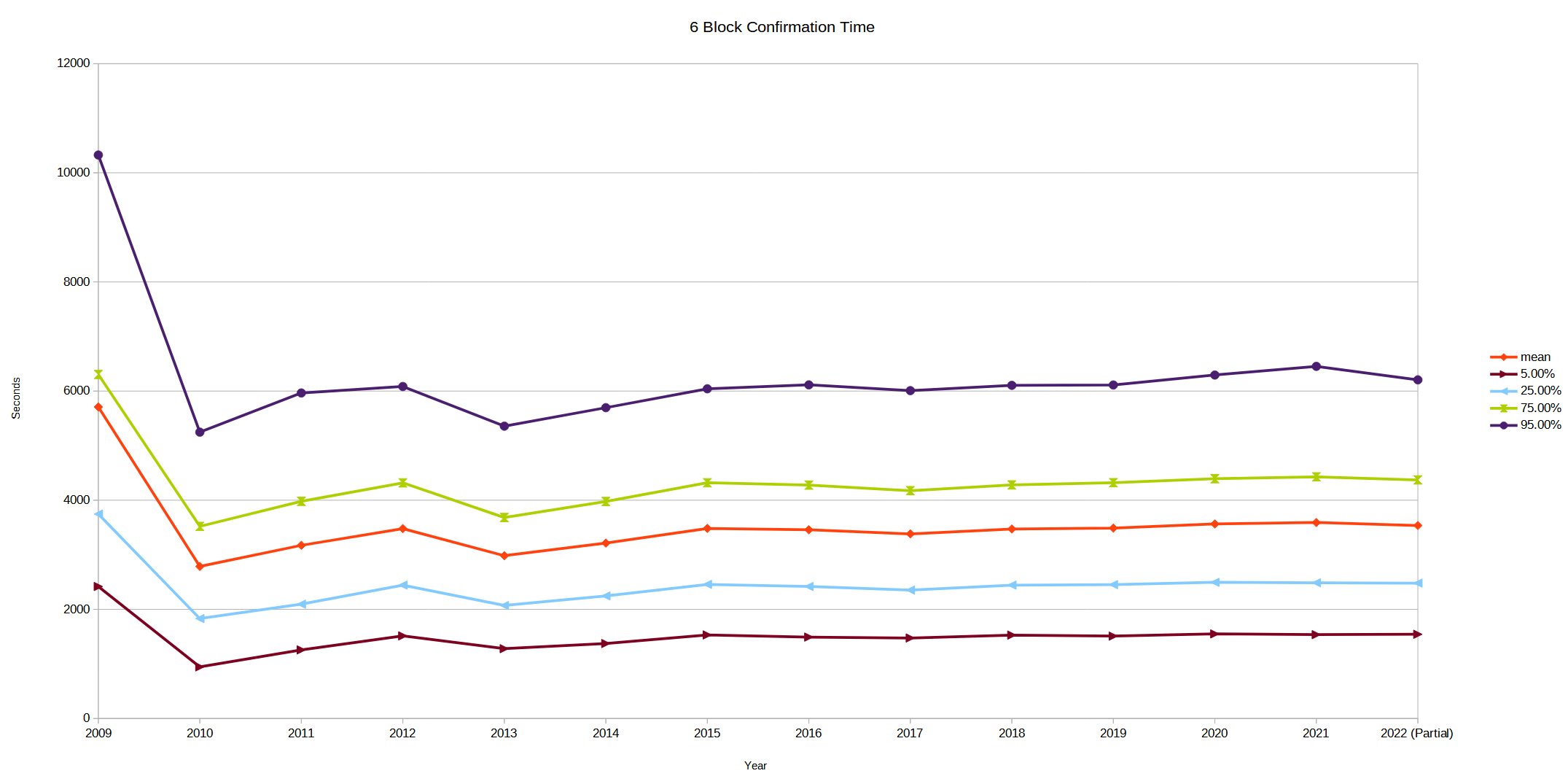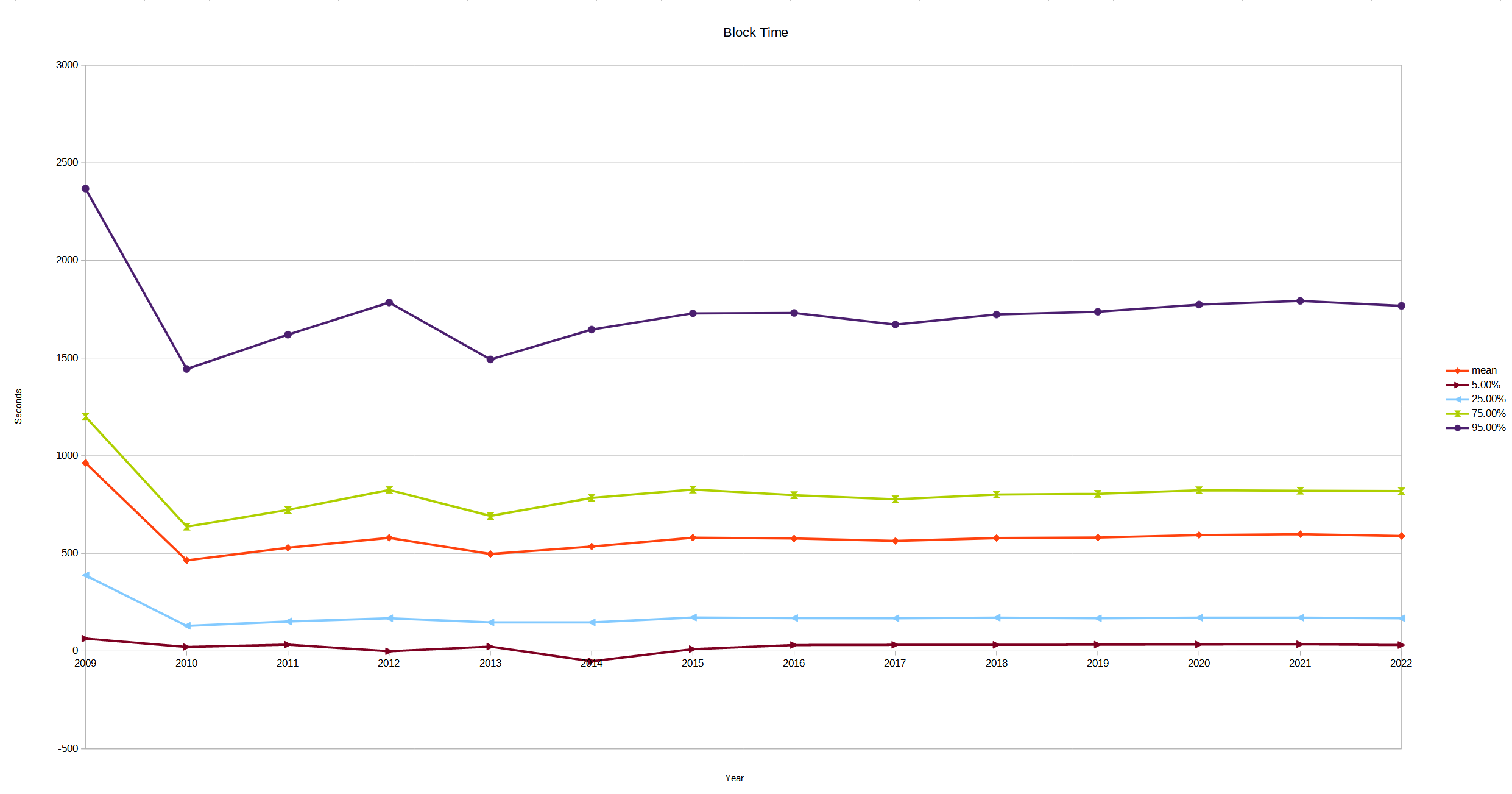In a previous post, I summarised that the block time recorded for any Bitcoin block could be as much as 1 hour earlier or 2 hours later than the actual time, under the ideal timing of 10-minute blocks.
This is theoretical, based on what block validators would accept, but I was curious as to the actual time inaccuracy present within blocks. Between blocks 765069 (28th November 2022) and 765873 (4th December 2022) I sampled 100 blocks, comparing their timing to when my full node received and exposed those blocks via the RPC API.
A simple python script was written that continuously polled my full node for the current block height. This was compared to the previous response and if it differed, a new block had been found. On a new block being identified, the script obtained the local machine’s time (which is synchronised via NTP, Network Time Protocol, daily) and logged it against the block number and block time. These were then compared to establish the offset.
The following should be noted when considering this data:
- It does not account for the time taken for my node to be updated by peers as to a new block being found. This is expected to be variable but within a few seconds, depending on the peering of the miner and my node. The node reported a maximum latency of 281ms for peers when reviewed; this will be variable, however.
- It does not account for any delay in my node exposing a new block via the RPC API. This is expected to be minimal as once the block is validated it is expected to be exposed. Validation requires minimal resources and the node is operating on a modern multicore system with ample RAM.
- The block samples were taken during the period 09:00 to 20:00 UTC; it does not, therefore, account for variations relating to timezones/blocks found outside of these hours. This is considered to be negligible as most miners and nodes will operate 24/7 (bar maintenance) and therefore are not affected by the time of day.
- The script polled was configured to query the node every 50ms. This rate was chosen so as not to overload the RPC server, or delay/block the processing of a new block. In addition, the code’s overhead means that additional time is required to perform the checks and logging as well as network latency. From the output, this appears to be around 50-70ms.
- Block header times being in Unix time are only as precise as 1 second. This analysis does not seek to determine accuracy to 10s of ms but rather provides an overview.
Overall I would expect the local time to be within 1-4 seconds of the block creation, but this is unproven. This may be considered further with an experiment on the Bitcoin Testnet.
The results were somewhat unspectacular; the largest difference was 51 seconds, the smallest -16 with an average (mean and median) of 21 seconds. Based on the sample, a tolerance of +/- 60 seconds appears reasonable when considering block times.
The full captured data is below:
| Block Height | Detected New Block (Readable) | Detected New Block (Unix) | Block Time (Unix) | Time Difference (seconds) |
| 765069 | 28/11/22 17:24:36 | 1669656276 | 1669656248 | 28 |
| 765070 | 28/11/22 17:42:17 | 1669657337 | 1669657337 | 0 |
| 765071 | 28/11/22 17:42:49 | 1669657369 | 1669657337 | 32 |
| 765072 | 28/11/22 17:43:23 | 1669657403 | 1669657368 | 35 |
| 765073 | 28/11/22 17:47:34 | 1669657654 | 1669657624 | 30 |
| 765074 | 28/11/22 17:49:46 | 1669657786 | 1669657774 | 12 |
| 765075 | 28/11/22 17:54:36 | 1669658076 | 1669658048 | 28 |
| 765076 | 28/11/22 18:07:37 | 1669658857 | 1669658818 | 39 |
| 765077 | 28/11/22 18:15:57 | 1669659357 | 1669659324 | 33 |
| 765078 | 28/11/22 18:19:35 | 1669659575 | 1669659560 | 15 |
| 765079 | 28/11/22 18:25:54 | 1669659954 | 1669659920 | 34 |
| 765080 | 28/11/22 18:27:04 | 1669660024 | 1669660015 | 9 |
| 765081 | 28/11/22 18:58:21 | 1669661901 | 1669661882 | 19 |
| 765082 | 28/11/22 19:04:53 | 1669662293 | 1669662264 | 29 |
| 765303 | 30/11/22 09:12:13 | 1669799533 | 1669799493 | 40 |
| 765304 | 30/11/22 09:22:14 | 1669800134 | 1669800098 | 36 |
| 765305 | 30/11/22 09:35:16 | 1669800916 | 1669800896 | 20 |
| 765306 | 30/11/22 09:35:38 | 1669800938 | 1669800916 | 22 |
| 765307 | 30/11/22 09:37:09 | 1669801029 | 1669800978 | 51 |
| 765308 | 30/11/22 09:38:34 | 1669801114 | 1669801110 | 4 |
| 765309 | 30/11/22 09:40:12 | 1669801212 | 1669801204 | 8 |
| 765310 | 30/11/22 10:12:19 | 1669803139 | 1669803134 | 5 |
| 765311 | 30/11/22 10:19:10 | 1669803550 | 1669803530 | 20 |
| 765312 | 30/11/22 10:22:22 | 1669803742 | 1669803720 | 22 |
| 765313 | 30/11/22 10:28:26 | 1669804106 | 1669804105 | 1 |
| 765314 | 30/11/22 11:23:03 | 1669807383 | 1669807358 | 25 |
| 765315 | 30/11/22 12:22:14 | 1669810934 | 1669810918 | 16 |
| 765316 | 30/11/22 12:34:40 | 1669811680 | 1669811649 | 31 |
| 765317 | 30/11/22 12:43:18 | 1669812198 | 1669812172 | 26 |
| 765318 | 30/11/22 12:49:20 | 1669812560 | 1669812520 | 40 |
| 765319 | 30/11/22 12:51:41 | 1669812701 | 1669812662 | 39 |
| 765320 | 30/11/22 12:52:25 | 1669812745 | 1669812722 | 23 |
| 765336 | 30/11/22 17:01:23 | 1669827683 | 1669827672 | 11 |
| 765337 | 30/11/22 17:04:00 | 1669827840 | 1669827832 | 8 |
| 765338 | 30/11/22 17:09:20 | 1669828160 | 1669828141 | 19 |
| 765339 | 30/11/22 17:10:19 | 1669828219 | 1669828182 | 37 |
| 765340 | 30/11/22 17:33:33 | 1669829613 | 1669829586 | 27 |
| 765341 | 30/11/22 17:37:53 | 1669829873 | 1669829839 | 34 |
| 765342 | 30/11/22 17:45:15 | 1669830315 | 1669830282 | 33 |
| 765449 | 01/12/22 09:09:59 | 1669885799 | 1669885752 | 47 |
| 765450 | 01/12/22 09:23:44 | 1669886624 | 1669886614 | 10 |
| 765451 | 01/12/22 09:26:54 | 1669886814 | 1669886787 | 27 |
| 765452 | 01/12/22 09:34:53 | 1669887293 | 1669887266 | 27 |
| 765453 | 01/12/22 09:44:25 | 1669887865 | 1669887863 | 2 |
| 765454 | 01/12/22 10:03:22 | 1669889002 | 1669888984 | 18 |
| 765455 | 01/12/22 10:22:07 | 1669890127 | 1669890088 | 39 |
| 765456 | 01/12/22 10:31:08 | 1669890668 | 1669890684 | -16 |
| 765457 | 01/12/22 10:47:09 | 1669891629 | 1669891602 | 27 |
| 765458 | 01/12/22 10:56:48 | 1669892208 | 1669892200 | 8 |
| 765459 | 01/12/22 11:04:53 | 1669892693 | 1669892689 | 4 |
| 765460 | 01/12/22 11:05:25 | 1669892725 | 1669892723 | 2 |
| 765461 | 01/12/22 11:15:02 | 1669893302 | 1669893294 | 8 |
| 765462 | 01/12/22 11:28:46 | 1669894126 | 1669894113 | 13 |
| 765463 | 01/12/22 11:38:08 | 1669894688 | 1669894683 | 5 |
| 765464 | 01/12/22 11:40:48 | 1669894848 | 1669894829 | 19 |
| 765465 | 01/12/22 11:57:31 | 1669895851 | 1669895831 | 20 |
| 765466 | 01/12/22 11:57:44 | 1669895864 | 1669895851 | 13 |
| 765467 | 01/12/22 12:21:48 | 1669897308 | 1669897265 | 43 |
| 765468 | 01/12/22 12:25:17 | 1669897517 | 1669897489 | 28 |
| 765492 | 01/12/22 17:38:10 | 1669916290 | 1669916282 | 8 |
| 765493 | 01/12/22 17:42:12 | 1669916532 | 1669916507 | 25 |
| 765494 | 01/12/22 17:43:30 | 1669916610 | 1669916576 | 34 |
| 765495 | 01/12/22 18:01:50 | 1669917710 | 1669917689 | 21 |
| 765496 | 01/12/22 18:02:50 | 1669917770 | 1669917734 | 36 |
| 765497 | 01/12/22 18:14:01 | 1669918441 | 1669918434 | 7 |
| 765498 | 01/12/22 18:18:35 | 1669918715 | 1669918681 | 34 |
| 765584 | 02/12/22 09:11:29 | 1669972289 | 1669972281 | 8 |
| 765585 | 02/12/22 09:12:09 | 1669972329 | 1669972319 | 10 |
| 765586 | 02/12/22 09:12:52 | 1669972372 | 1669972359 | 13 |
| 765587 | 02/12/22 09:42:20 | 1669974140 | 1669974128 | 12 |
| 765588 | 02/12/22 10:48:37 | 1669978117 | 1669978106 | 11 |
| 765589 | 02/12/22 11:01:44 | 1669978904 | 1669978875 | 29 |
| 765590 | 02/12/22 11:07:43 | 1669979263 | 1669979232 | 31 |
| 765591 | 02/12/22 11:10:53 | 1669979453 | 1669979437 | 16 |
| 765592 | 02/12/22 11:43:52 | 1669981432 | 1669981415 | 17 |
| 765593 | 02/12/22 11:49:53 | 1669981793 | 1669981764 | 29 |
| 765594 | 02/12/22 12:46:13 | 1669985173 | 1669985136 | 37 |
| 765595 | 02/12/22 13:01:57 | 1669986117 | 1669986090 | 27 |
| 765596 | 02/12/22 13:02:41 | 1669986161 | 1669986152 | 9 |
| 765597 | 02/12/22 13:04:07 | 1669986247 | 1669986202 | 45 |
| 765598 | 02/12/22 13:06:29 | 1669986389 | 1669986383 | 6 |
| 765599 | 02/12/22 13:11:02 | 1669986662 | 1669986665 | -3 |
| 765600 | 02/12/22 13:30:13 | 1669987813 | 1669987810 | 3 |
| 765601 | 02/12/22 13:31:08 | 1669987868 | 1669987844 | 24 |
| 765602 | 02/12/22 13:32:53 | 1669987973 | 1669987969 | 4 |
| 765603 | 02/12/22 13:47:45 | 1669988865 | 1669988854 | 11 |
| 765758 | 03/12/22 18:07:12 | 1670090832 | 1670090811 | 21 |
| 765759 | 03/12/22 18:42:51 | 1670092971 | 1670092945 | 26 |
| 765760 | 03/12/22 18:45:11 | 1670093111 | 1670093072 | 39 |
| 765863 | 04/12/22 12:57:03 | 1670158623 | 1670158612 | 11 |
| 765864 | 04/12/22 13:17:57 | 1670159877 | 1670159860 | 17 |
| 765865 | 04/12/22 13:24:47 | 1670160287 | 1670160264 | 23 |
| 765866 | 04/12/22 13:37:48 | 1670161068 | 1670161040 | 28 |
| 765867 | 04/12/22 13:39:41 | 1670161181 | 1670161149 | 32 |
| 765868 | 04/12/22 14:05:38 | 1670162738 | 1670162732 | 6 |
| 765869 | 04/12/22 14:22:54 | 1670163774 | 1670163755 | 19 |
| 765870 | 04/12/22 14:49:31 | 1670165371 | 1670165321 | 50 |
| 765871 | 04/12/22 15:04:39 | 1670166279 | 1670166273 | 6 |
| 765872 | 04/12/22 15:15:31 | 1670166931 | 1670166910 | 21 |
| 765873 | 04/12/22 15:37:56 | 1670168276 | 1670168257 | 19 |


